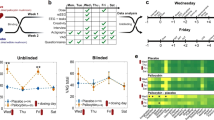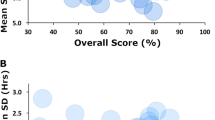Abstract
METHODS for measuring antioxidants and appraising antioxidant activity appear to be of two general types. If the chemical nature of the antioxidant is known, one may strive for a test specific for the compound or group of interest; for example, the nitroprusside test for sulphydryl groups. Alternatively one may observe the inhibition of some natural oxidative process such as the β-oxidation of fats, as a function of the added antioxidant.
This is a preview of subscription content, access via your institution
Access options
Subscribe to this journal
Receive 51 print issues and online access
$199.00 per year
only $3.90 per issue
Buy this article
- Purchase on Springer Link
- Instant access to full article PDF
Prices may be subject to local taxes which are calculated during checkout
Similar content being viewed by others
References
Goldschmidt, S., and Renn, K., Chem. Ber., 55, 628 (1922). Poirier, R. H., Kahler, E. J., and Benington, F., J. Org. Chem., 17, 1437 (1952). Braude, E. A., Brook, A. G., and Linstead, R. P., J. Chem. Soc., 3574 (1954).
Blois, M. S., Biochim. Biophys. Acta, 18, 165 (1955).
Author information
Authors and Affiliations
Rights and permissions
About this article
Cite this article
BLOIS, M. Antioxidant Determinations by the Use of a Stable Free Radical. Nature 181, 1199–1200 (1958). https://doi.org/10.1038/1811199a0
Issue Date:
DOI: https://doi.org/10.1038/1811199a0
This article is cited by
-
Embryo growth alteration and oxidative stress responses in germinating Cucurbita pepo seeds exposed to cadmium and copper toxicity
Scientific Reports (2024)
-
Comparative assessment of phenolic composition profile and biological activities of green extract and conventional extracts of Salvia sclarea
Scientific Reports (2024)
-
Evaluation of antioxidant and cytotoxicity activities of polyphenol extracted from brown seaweed Sargassum tenerrimum biomass
Biomass Conversion and Biorefinery (2024)
-
Antioxidant, Cytotoxicity, and Anti-inflammation Activities of Phenanthroline Adducts of Zn(II) and Ni(II) bis(N-alkyl-N-phenyldithiocarbamate)
Chemistry Africa (2024)
-
Multivariate Analysis of Equisetum arvense L. Ecotypes Based on Silicon Content, Phytochemical and Morphological Characterization
Silicon (2024)
Comments
By submitting a comment you agree to abide by our Terms and Community Guidelines. If you find something abusive or that does not comply with our terms or guidelines please flag it as inappropriate.



